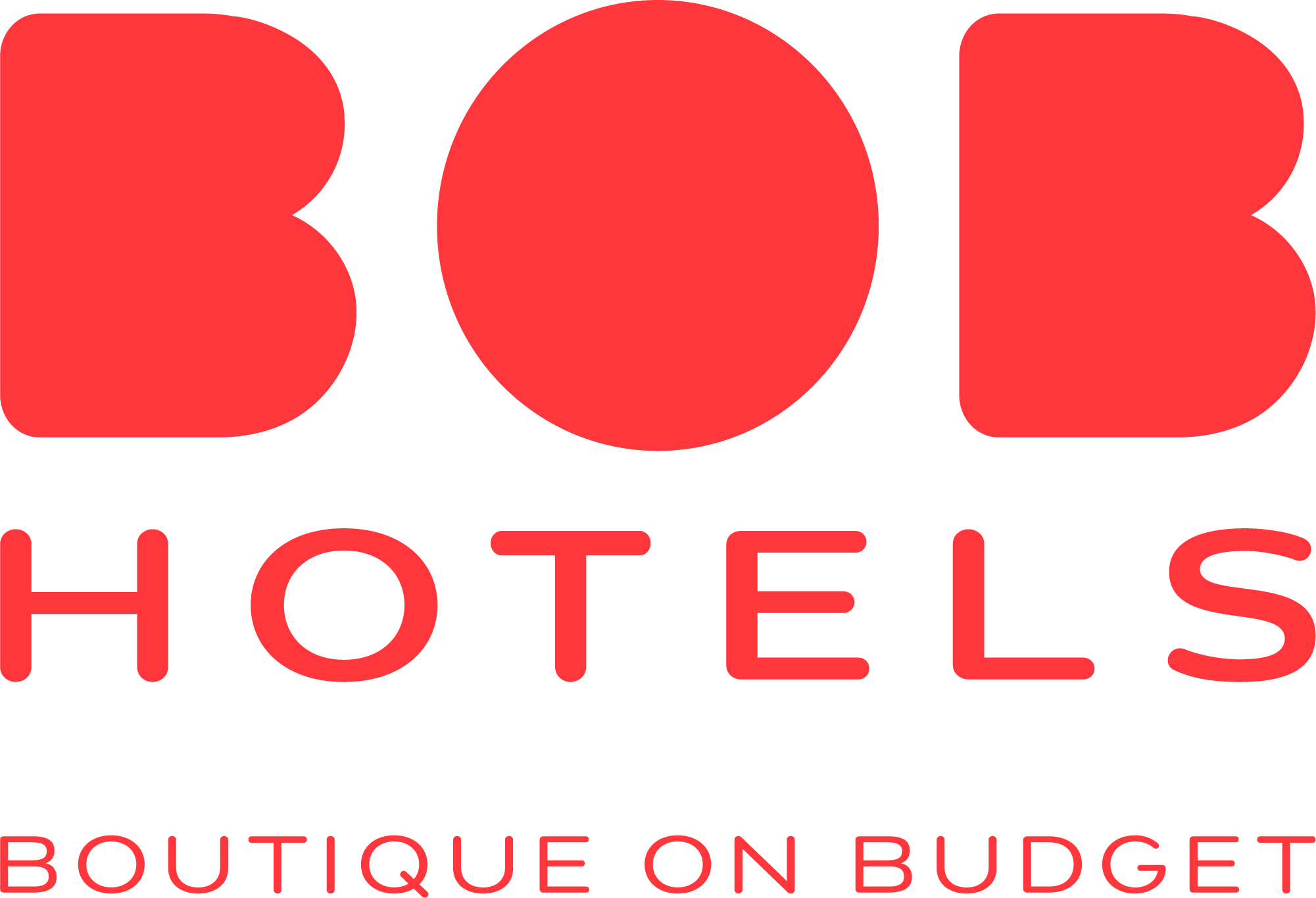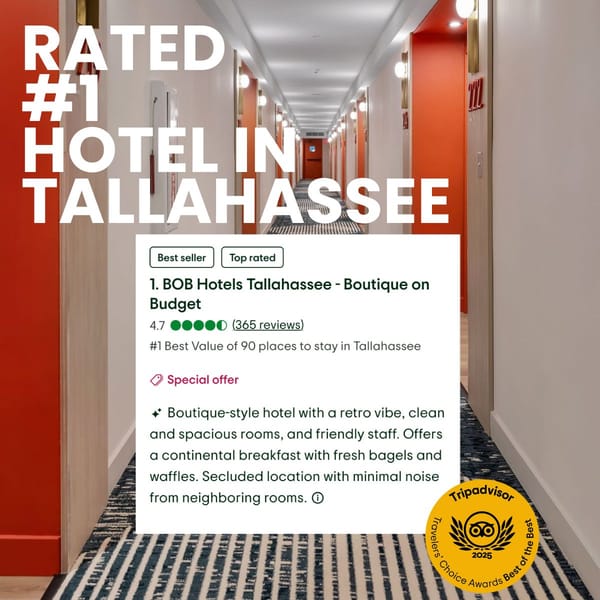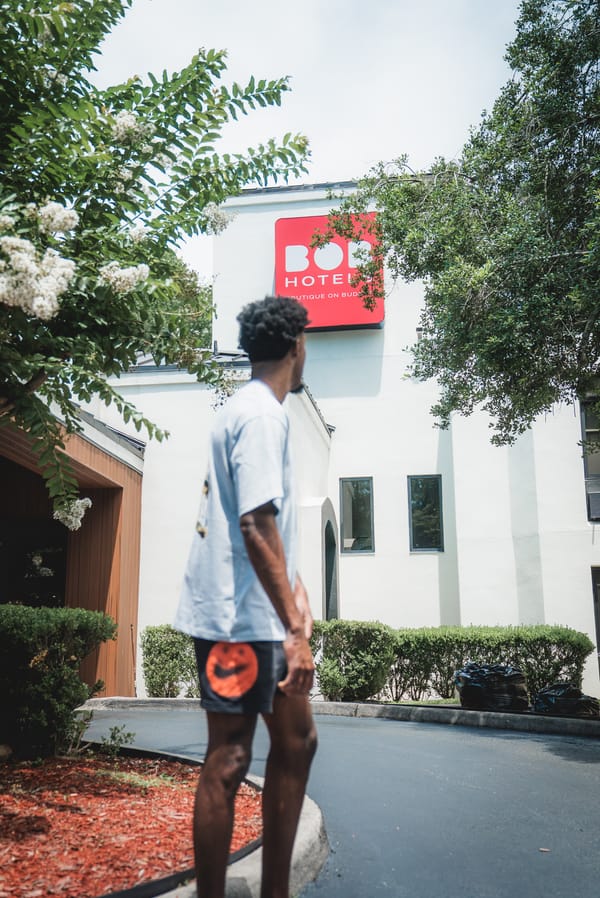7 Tips for Booking Affordable Hotels Without Sacrificing Comfort
Learn how to book comfortable hotels affordably with tips on price comparisons, timing, rewards programs, and essential amenities.

Want to book a comfortable hotel without overspending? Here's how:
- Compare Prices Online: Use tools like Kayak, Google Hotels, or Trivago. Enable price alerts and search in incognito mode to avoid price hikes.
- Pick the Right Dates: Travel during low seasons or weekdays for savings up to 50%.
- Join Rewards Programs: Loyalty programs can save 10-15% and offer perks like free upgrades.
- Focus on Key Amenities: Prioritize essentials like free Wi-Fi, comfortable beds, and free breakfast to cut costs.
- Read Reviews: Check recent feedback for cleanliness, comfort, and hidden fees.
- Negotiate with Small Hotels: Direct bookings often lead to better prices or perks.
- Choose the Right Location: Stay near your activities to save on transportation costs.
These strategies ensure you get great value without compromising comfort. Let’s break them down further.
How to find CHEAP HOTEL deals (4 easy hotel booking tips)
1. Compare Hotel Prices Online
Finding great hotel deals is easier with the right tools. 65% of travelers now use metasearch engines to plan their stays [2]. Here’s how to make the most of these tools and avoid common pricing traps.
Top Tools for Price Tracking
Price comparison platforms can give you an edge. Kayak, for instance, processes over 2 billion price quotes every day [1], offering a price forecasting feature to help you decide when to book. Google Hotels simplifies neighborhood comparisons with its map interface, while Trivago aggregates data from hundreds of booking sites [1][2].
Since hotel rates can swing by as much as 40% in a single day [2], enabling price alerts on these platforms can help you snag the best deals.
Use Incognito Mode for Searches
Avoid price hikes caused by tracking cookies by searching in private browsing mode. Many booking sites monitor your search history and may adjust prices based on demand [3]. Clearing your browser cookies before starting a new search can also help.
Direct Booking vs. Third-Party Platforms
Hotels sometimes offer direct bookings at rates that are 15-20% lower, as they avoid third-party fees [10]. Here’s a quick breakdown of the key differences:
| Method | Pros | Notes |
|---|---|---|
| Direct with Hotel | • Lower rates • Flexible cancellation • Earn loyalty points |
Always verify rates directly on the hotel’s website |
| Third-Party Sites | • Easy to compare • Package deals • Exclusive app offers |
Policies may be less flexible |
| Metasearch Engines | • Broad price overview • Price tracking tools |
No direct booking options |
Once you’ve found the best price, timing your booking strategically (discussed in the next section) can help you save even more.
2. Choose the Right Travel Dates
Timing can make a big difference in hotel prices without sacrificing quality. Recent data shows that picking the right travel dates can cut hotel costs by up to 50% [4][1].
Book During Low Season
Low season varies by destination, but it’s when you’ll find the best deals. For example, European hotels often lower their rates from November to March (excluding holidays). During this time, luxury hotels in Paris may drop their prices by as much as 40% - a €500 room during peak season could cost just €300 in February [4][1].
Here’s a quick guide to low seasons and savings for popular destinations:
| Destination Type | Low Season | Typical Savings |
|---|---|---|
| European Cities | Nov - March | 20-40% |
| Tropical Resorts | June - Nov | 30-50% |
| Business Cities | Weekends | 30-40% |
Weekday vs. Weekend Rates
Hotel prices often depend on location and the type of traveler they cater to. Hotels in business districts usually charge 30-40% less on weekends [3], while resort areas tend to be cheaper on weekdays. For instance, a New York City hotel might cost $200 on a Tuesday but jump to $300 on a Saturday.
To save more:
- Pick weekdays for resort stays
- Check for events that might affect prices
- Consider traveling during the "shoulder season" (the period between peak and off-peak seasons)
Tips for Last-Minute Bookings
Although booking early is generally safer, last-minute deals can sometimes lead to big savings. Hotels often cut prices by up to 50% to fill empty rooms [11], especially in cities with plenty of accommodation options.
For the best last-minute deals:
- Use apps like HotelTonight for same-day bookings
- Look for destinations with lots of hotel availability
- Avoid this approach during major events or peak travel times
- Aim to book within 24-48 hours of your arrival
Expedia's 2023 Travel Trends report found that booking 15 days in advance can save 13% compared to booking four months ahead [3]. For international trips, plan 2-3 months in advance, while domestic trips often see better rates just 15 days out [3]. Also, Sunday bookings tend to be about 6% cheaper than Fridays [8].
Once your travel dates are locked in, you can use loyalty programs to score extra perks (we’ll dive into that next).
3. Join Rewards Programs
Hotel rewards programs are a great way to save money while enjoying comfortable stays. Data shows loyalty members can save 3-7% on room rates compared to non-members [6], and with perks and points, total savings can reach 10-15%.
Hotel Points Programs
Many major hotel chains offer rewards programs that help reduce costs:
| Program | Base Points per $ | Key Benefits |
|---|---|---|
| Hilton Honors | Up to 20 [1] | Free breakfast, room upgrades, no blackout dates |
| Marriott Bonvoy | Up to 17.5 [1] | 30+ brands, flexible point transfers |
| IHG One Rewards | Up to 17 [1] | Frequent bonus offers, diverse portfolio |
For budget travelers, the Booking.com Genius program is a solid choice. It provides instant savings without requiring point accumulation:
- Level 1 (2 stays): 10% off at over 390,000 properties [4]
- Level 2 (5 stays): 15% off plus free breakfast [4]
- Level 3 (15 stays): 20% off and priority support [4]
Card and Group Discounts
Pairing credit cards with loyalty programs can amplify savings. For example, the American Express Platinum Card offers free elite status with Hilton and Marriott [2], while the World of Hyatt Credit Card includes automatic Discoverist status and an annual free night certificate [2].
Memberships in organizations can also lead to discounts:
- AARP: Up to 15% off at major hotel chains (available to everyone) [11]
- AAA: Discounts ranging from 5-15% plus exclusive rates [11]
- Alumni Associations: Special rates through university partnerships [11]
Boutique Hotel Perks
Boutique hotels, like those in the BOB Hotels program, provide a mix of affordability and personalized experiences. Their loyalty program offers a 5% discount, free upgrades (when available), and late check-out options [5].
To make the most of rewards programs:
- Combine loyalty numbers with cash-back portals for extra savings
- Book during promotional periods for added discounts
- Look for status match opportunities between hotel chains
- Evaluate any paid memberships to ensure savings outweigh the cost
Frequent travelers can see $50-$100 in nightly value through perks like free breakfasts and room upgrades [3]. Choose programs that align with your travel habits to maximize benefits.
4. Pick the Right Hotel Features
After making the most of loyalty perks, shift your attention to amenities that directly impact your comfort. According to a 2024 TripAdvisor survey, 87% of travelers rank comfortable beds as their top priority, closely followed by cleanliness (82%) and free Wi-Fi (76%) [4].
Must-Have vs. Extra Features
Focus on the essentials that add the most value to your stay. A 2025 Hotels.com study found that while 62% of travelers were willing to pay extra for high-speed internet, only 23% would spend on premium TV channels [1].
Here are the key amenities to prioritize:
| Essential Features | Why They Matter |
|---|---|
| Comfortable Beds | Vital for quality sleep |
| Free Wi-Fi | Keeps you connected |
| Climate Control | Ensures a comfortable room temperature |
| Hot Water/Pressure | Meets basic hygiene needs |
| Soundproofing | Improves sleep and privacy |
Money-Saving Hotel Services
Choosing the right hotel services can help you cut down on travel costs. A 2024 Expedia report revealed that hotels offering free breakfast experienced a 16% increase in bookings compared to those without this perk [3].
Look for these cost-saving services:
| Service | Typical Savings | Notes |
|---|---|---|
| Free Breakfast | $10-20/person/day | Ideal for families |
| Airport Shuttle | $20-50/trip | Handy for airport stays |
| Kitchenette | Cuts meal costs by 30-50% | Great for preparing meals |
| Free Parking | $15-45/day | Especially useful in cities |
| Laundry Facilities | Saves $15-30/load | Perfect for longer stays |
"Hotels focusing on essential amenities saw 28% higher guest satisfaction and 15% more repeat bookings", according to a 2025 Hospitality Technology study [14].
Your needs will guide your choices - business travelers may prioritize Wi-Fi and workspaces, while families benefit more from free breakfast and kitchenettes.
Once you've identified your must-haves, confirm your selections by checking guest reviews (discussed in the next section).
5. Read Past Guest Reviews
Guest reviews play a big role in deciding where to stay. In fact, 93% of travelers say online reviews influence their booking choices[5]. Knowing how to evaluate these reviews can help you find a comfortable stay without breaking the bank.
Focus on Recent Feedback
Stick to reviews from the last 3-6 months for the most up-to-date information about the hotel's condition. A Cornell study analyzing 95,500 TripAdvisor reviews found that hotels responding to at least 40% of reviews tend to have higher occupancy rates, showing better management and service.
| Key Factors | What to Pay Attention To |
|---|---|
| Cleanliness | Comments about spotless rooms, fresh linens, clean bathrooms |
| Comfort | Feedback on bed quality, room temperature, noise levels |
| Staff Service | Mentions of polite and helpful staff, quick issue resolution |
| Value | Reviews discussing amenities compared to the price |
| Maintenance | Notes on facility upkeep and room condition |
Look for reviews from travelers with similar priorities. For instance, if you're traveling for work, check for mentions of reliable Wi-Fi or a comfortable workspace.
Watch for Recurring Issues
Certain complaints popping up repeatedly can be a red flag. Here are some issues to keep an eye on:
- Frequent mentions of thin walls or noisy surroundings
- Multiple complaints about poor cleanliness
- Ongoing reports of maintenance problems
- Consistent feedback about unhelpful staff
- Regular notes about unexpected fees
Use tools like Booking.com’s filters to narrow reviews by traveler type and specific amenities[9]. Aim to read 20-30 recent reviews and check guest-uploaded photos - this is a must for 83% of travelers[15].
Once you've narrowed down your options, contacting the hotel directly might help you snag better deals (see Tip 6).
6. Ask Small Hotels for Deals
Independent hotels often have more room to adjust their rates compared to big chains. According to the American Hotel & Lodging Association, 23% of independent hotels are more likely to offer tailored rates to those who book directly, unlike chain hotels [1][3]. This tip works best after narrowing down your options using guest reviews (see Tip 5).
Reach Out for Lower Rates
Timing and a thoughtful approach can make a big difference when contacting small hotels. For example, BOB Hotels Tallahassee offers $70 rates during their off-season. When you reach out, include key details to strengthen your case:
| Information to Provide | Why It Matters |
|---|---|
| Stay Details (dates, duration, group size) | Helps match your request with availability and room types |
| Special Occasions | Could result in free upgrades or added perks |
| Competitor Rates | Shows you're informed and opens the door to negotiation |
A survey by Small Luxury Hotels of the World found that 62% of their member hotels are more likely to provide upgrades or special amenities for direct bookings [2][4].
Offer Reviews in Exchange for Perks
Independent hotels often value authentic promotion, as travelers trust online reviews as much as personal recommendations [6].
-
Be Clear About Your Offer
Politely suggest sharing your experience through reviews or social media. 68% of independent hotels consider offering upgrades in exchange for social media exposure [13][12]. -
Highlight Mutual Benefits
Negotiations often involve perks like free amenities, access to facilities, or upgraded experiences.
Make sure to confirm any agreements in writing, ideally via email. Data from European hotels shows that 72% provide better value to guests who book directly [7].
Once you've shortlisted hotels based on reviews, approach them professionally and courteously. Many small hotels, like BOB Hotels, aim to grow their reputation and appreciate thoughtful engagement. Building a good relationship can lead to better deals and a more personalized experience in the future.
7. Pick the Best Location
Where you stay can make or break both your budget and your travel experience. According to Expedia, downtown hotels are typically 30-50% pricier than suburban options[4]. But don’t just focus on the nightly rate - your hotel’s location can lead to hidden costs or savings that impact your trip overall. After locking in great rates (see Tip 6), choosing the right location ensures you don’t lose those savings elsewhere.
Stay Close to Activities
Choosing a hotel near your main activities can save you both time and money on transportation. For example, a family staying close to Disney World in Orlando could save 1-2 hours a day and $30-$50 daily in parking fees[17]. Here's how different locations compare:
| Location Type | Benefits | Trade-offs |
|---|---|---|
| City Center | Walkable to attractions | Higher room and dining costs |
| Near Transit Hub | Easy access, moderate rates | Adds cost for transit passes |
| Suburban Area | Lower rates, quieter | Longer commutes, added transport costs |
Hotels near universities or business districts often strike a good balance with competitive rates and convenient access.
Compare City vs. Suburb Costs
When deciding between staying in the city or the suburbs, don’t just look at the room rate - factor in the total cost of your trip. A 5-night stay in Chicago, for instance, might seem cheaper in the suburbs, but transportation costs can quickly cancel out those savings[16]. Think about these expenses:
- Transportation: Public transit passes, taxi rides, or car rentals
- Dining: Restaurants in city centers charge 47% more on average compared to suburban spots[2]
- Time: Consider the value of time spent commuting versus enjoying your destination
For business travelers, staying near meeting venues can often justify a higher room rate. In San Francisco, for example, staying in SoMa near the Moscone Center instead of Union Square can save 15-25% on hotel costs while keeping things convenient[16].
The price difference between central and outlying hotels offers opportunities to find better-located options without overspending. Pair this with price-tracking tools (see Tip 1) to make sure you’re getting the best deal[11].
Conclusion: Smart Booking Tips
By using these seven strategies - like comparing prices and choosing the right location - you can regularly find comfortable hotels at great prices. These tips include price tracking, being flexible with dates, using loyalty rewards, focusing on amenities, analyzing reviews, negotiating directly, and assessing location.
Timing plays a big role in saving money. For example, our analysis found that seasonal discounts can save you up to 40%, and booking in advance can shave off 15%. These benefits are most effective when combined with loyalty programs and direct negotiation methods.
Picking hotels in convenient locations (as mentioned in Tip 7) ensures you won't lose those savings to transportation expenses. Adding corporate rates (Tip 3) and thorough review analysis (Tip 5) helps you consistently find quality accommodations within your budget.
Tools like price alerts and review platforms (Tips 1 and 5) have changed the way travelers spot and book the best deals. By following these strategies step by step, you can enjoy both savings and comfort during your trips.
FAQs
Here are answers to some common questions about timing your hotel bookings:
What is the cheapest day to book a hotel?
Booking a hotel midweek - between Monday and Thursday - often leads to lower rates. According to Kayak, you can save 5-10% by booking 2-3 weeks in advance [2]. This ties into the weekday booking strategy mentioned earlier for getting the best deals.
Do hotel room prices go down closer to the date?
Yes, booking closer to your travel date can lead to discounts. Data from 2019-2021 shows that booking 15 days in advance can save you around 13% compared to booking four months ahead [3]. However, this tactic has its risks, particularly during busy seasons or major events when availability may be limited.
Here’s how savings vary based on timing:
| Booking Timeline | Average Savings | Best For |
|---|---|---|
| 15 days ahead | 13% savings | Last-minute trips |
| 2-3 weeks ahead | 5-10% savings | A balanced approach |
| 4 months ahead | Base price | Guaranteed options |
For the best results, pair last-minute booking strategies with off-season travel and a good understanding of your destination (as discussed earlier).




